

Principles of Adult Learning. APCEP - Associação Portuguesa para a Cultura e Educação Permanente. APEFA. “Humans, not just students” – In-service training boosts Danish educators’ skills - Elm - European lifelong learning magazine. Professional qualifications for adult educators have been subject for discussion and a research question for more than thirty years.
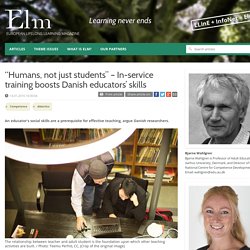
The content and the form of adult educator training programs have been debated vigorously. In this article we illustrate the advantages of competence development as in-service training. Thus, our focus is to describe how competence development of adult educators can be accomplished as an integrated part of the daily practice in (adult education) schools. In the Danish example presented, we show how in-service training can be carried out with great impact on the teachers’ self-understanding, the educational culture of the school and even on dropout rates.
To better understand the conditions for this kind of training, we start with a brief overview of the qualifications needed to teach in different adult education sectors in Denmark. Non-formal training most effective Our case illustrates a particular training programme, run at five Adult education schools. Promoting adult learning. What is the Commission doing?
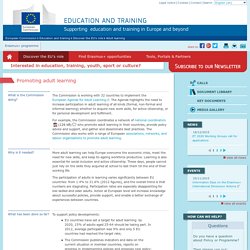
Why is it needed? More adult learning can help Europe overcome the economic crisis, meet the need for new skills, and keep its ageing workforce productive. Learning is also essential for social inclusion and active citizenship. These days, people cannot just rely on the skills they acquired at school to last them till the end of their working life. The participation of adults in learning varies significantly between EU countries: from 1.4% to 31.6% (2012 figures), and the overall trend is that numbers are stagnating. What has been done so far? To support policy developments: More efforts for basic skills education and increased digitalisation of adult education demanded by EU work group for matters of education policy. After two years of work, the current ET2020 work group for adult education presents recommendations in the areas of basic skills education, digitalisation and coherence of adult education.
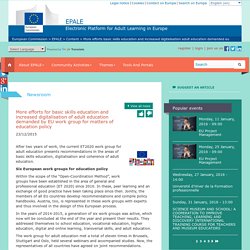
Six European work groups for education policy Within the scope of the “Open-Coordination Method”, work groups have been established in the area of general and professional education (ET 2020) since 2010. In these, peer learning and an exchange of good practice have been taking place since then. Jointly, the members of all EU countries develop recommendations and compile policy handbooks. Austria, too, is represented in these work groups with experts and thus involved in the design of this European process. In the years of 2014-2015, a generation of six work groups was active, which now will be concluded at the end of the year and present their results.
The role of higher education in the process of professionalisation of adult educators - Invitation for paper proposals. The role of higher education in the process of professionalisation of adult educators - Invitation for paper proposals 4th Biennial meeting of the ESREA Research Network for Adult Educators, Trainers and their Professionalisation (ReNAdET) 11‐13 November 2015, Cyprus Organised by the Open University of Cyprus (OUC) Invitation for paper proposals The purpose of ESREA‐ReNAdET biennial meetings is to bring together researchers, policy makers and practitioners from the field to present and exchange their ideas on the role/s of adult educators and trainers in Europe as well as to discuss issues relevant to their professional status and development.
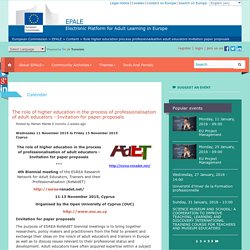
A limited number of papers (max. 50) will be presented. EPALE. Adult learning. Adult education made accessible. Adult education in Europe – A Civil Society View. On a daily basis, EAEA monitors proceedings on the general European level, and advocates for the importance of adult education.
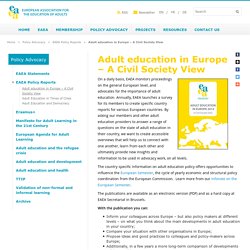
Annually, EAEA launches a survey for its members to create specific country reports for various European countries. By asking our members and other adult education providers to answer a range of questions on the state of adult education in their country, we want to create accessible overviews that will help us to connect with one another, learn from each other and ultimately provide new insights and information to be used in advocacy work, on all levels. The country specific information on adult education policy offers opportunities to influence the European Semester, the cycle of yearly economic and structural policy coordination from the European Commission.
Learn more from our infonote on the European Semester. The publications are available as an electronic version (PDF) and as a hard copy at EAEA Secretariat in Brussels. With the publication you can: UNESCO Institute for Lifelong Learning. 233814e. ALADIN Adult Learning Links. 232243E. Revisión de 6 marcos de referencia para habilidades de siglo XXI. Un estudio reciente, conducido por la firma Gallup, encontró que el desarrollo de habilidades de siglo XXI, en el último año escolar, se correlaciona positivamente con el mejor desempeño futuro en los puestos de trabajo.
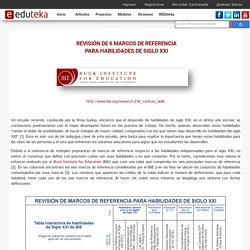
De hecho, quienes desarrollan estas habilidades “tienen el doble de posibilidades de hacer trabajos de mayor calidad, comparados con los que tienen bajo desarrollo en habilidades del siglo XXI” [1]. Este es solo uno de los hallazgos clave de este estudio, pero basta para resaltar la importancia que tienen estas habilidades para las vidas de las personas y el reto que enfrentan los sistemas educativos para lograr que los estudiantes las desarrollen. Debido a la existencia de múltiples propuestas de marcos de referencia respecto a las habilidades indispensables para el siglo XXI, no existe un consenso que defina con precisión cuáles son esas habilidades y en qué consisten.
NOTAS DEL EDITOR: [1] Gallup (2013). 21st Century Skills and the Workplace. Etiquetas: Conference Co-organizers. Conference Documents. Adult Informal Learning. Summary Futurelab is investigating the role that digital technologies play in adult informal learning.
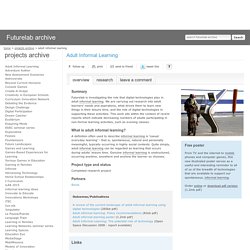
We are carrying out research into adult learners' needs and aspirations, what drives them to learn new things in their leisure time, and the role of digital technologies in supporting these activities. This work sits within the context of recent reports which indicate decreasing numbers of adults participating in non-formal learning activities, such as evening classes. What is adult informal learning? A definition often used to describe informal learning is 'casual everyday learning' - that is, spontaneous, natural and personally meaningful, typically occurring in highly social contexts.